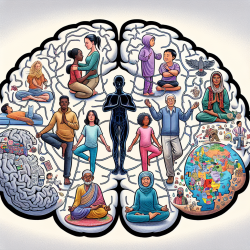The intricate relationship between culture and interoception is a fascinating area of study that can significantly impact therapeutic practices. The research article "Cross-cultural differences in somatic awareness and interoceptive accuracy" provides a comprehensive review of how cultural backgrounds influence our perception of bodily states. This understanding is crucial for practitioners aiming to enhance their skills and provide culturally sensitive care.
Key Findings from the Research
- Somatic Awareness vs. Interoceptive Accuracy: Non-Western cultures often exhibit heightened somatic awareness but lower interoceptive accuracy compared to Western cultures. This paradox highlights the complexity of how individuals perceive and interpret bodily cues.
- Cultural Influences: Cultural schemas and epistemologies play a significant role in shaping somatic focus. For instance, Eastern cultures often integrate bodily sensations with emotional expressions more than Western cultures.
- Impact on Psychopathology: The research suggests that heightened somatic awareness can lead to increased somatization in non-Western cultures, affecting the presentation and treatment of psychological disorders.
Practical Applications for Practitioners
Understanding these cultural nuances can greatly enhance therapeutic practices. Here are some ways practitioners can integrate these insights:
- Culturally Sensitive Assessments: Incorporate questions that explore clients' cultural backgrounds and how they relate to bodily awareness. This approach can uncover unique insights into their emotional and physical experiences.
- Meditation and Mindfulness: Encourage practices like meditation and mindfulness, which are rooted in Eastern traditions, to help clients improve their somatic awareness. However, be mindful that these practices may not necessarily enhance interoceptive accuracy.
- Education on Cultural Differences: Educate yourself and your clients about how cultural backgrounds can influence bodily perceptions. This knowledge can foster empathy and improve communication in therapeutic settings.
The Role of Further Research
The research highlights the need for further studies to explore the complexities of interoception across different cultures. Practitioners are encouraged to stay informed about new findings and consider participating in research initiatives that aim to deepen our understanding of these phenomena.
Conclusion
Cultural differences in somatic awareness and interoceptive accuracy offer valuable insights for practitioners seeking to provide culturally competent care. By integrating these findings into practice, therapists can enhance their ability to address the diverse needs of their clients effectively.
To read the original research paper, please follow this link: Cross-cultural differences in somatic awareness and interoceptive accuracy: a review of the literature and directions for future research.










